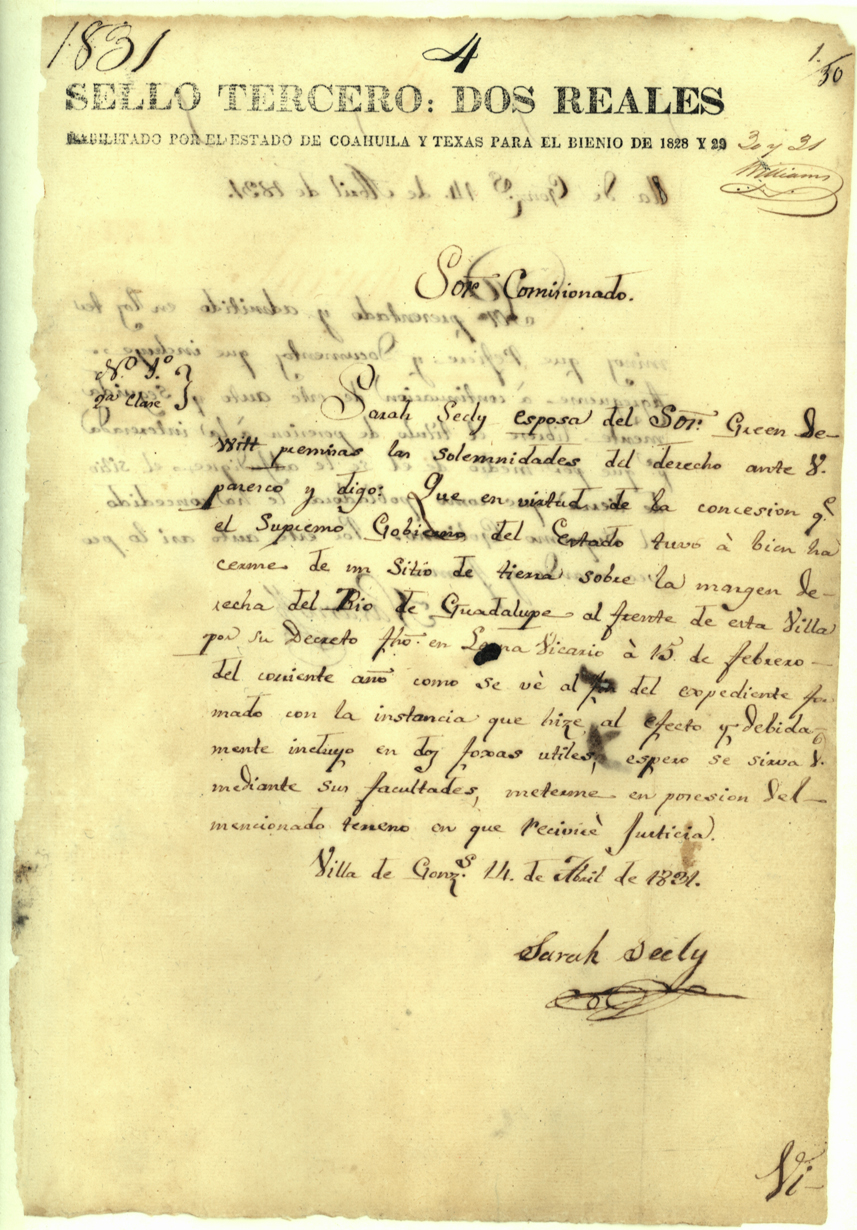Document Text |
Summary |
| I, Sarah Seely, wife of Mr. Green de Witt, appear before you with all the solemnities of the law and I state: By virtue of the license related to my plot of land located on the right bank of the Río de Guadalupe in front of this town, that which the Supreme Government of the State deemed fit to grant me in the decree made at Leona Vicario on the 15th of the current year as evidenced at the end of this document on two written pages, along with the request that I made to that effect, I hope that you, Sir, by means of your authority, will be willing to grant me possession of the aforementioned plot of land. By doing so, I will receive justice. | I am Sarah Seely, the wife of Mr. Green de Witt. I am asking that you give me full ownership of the land granted to me earlier this year. |
Sarah Seely DeWitt, “Sarah Seely Dewitt’s Petition for a Mexican Land Grant,” April 14, 1831. File NO. SC00119:4, Texas General Land Office.
Background
In the 1820s, the newly independent country of Mexico wanted to populate the state of Coahuila y Tejas with people loyal to the Mexican government. This was a deliberate attempt to overpower the Indigenous communities that already occupied the lands Mexico claimed. Few Mexican citizens were interested in moving to the state because it was too remote and dangerous. The government decided to encourage immigration to the territory instead.
The Mexican government granted a small group of men permission to start colonies in the Texas section of the state. They called these men empresarios, which is Spanish for “entrepreneur.” In return, the empresarios promised to recruit hundreds of families to live in their colonies and develop the land.
The majority of the empresarios were U.S. citizens. Most recruited U.S. citizens to join them in their new colonies. The settlers were supposed to swear loyalty to the Mexican government, join the Catholic Church, and learn Spanish. But the colonies were so far away from the Mexican capital that it was very difficult for the government to enforce these rules. The empresarios and their settlers ignored Mexican laws and customs, especially after the Mexican government abolished slavery in 1829. Their fierce independence would lead Texas to secede from Mexico in 1836.
About the Document
Sarah Seely Dewitt was the wife of empresario Green Dewitt. The Mexican government granted Green a colony in 1825 and gave him six years to settle 400 families there. Sarah sold off her own lands in Missouri to support him. She and five of their children moved to the Dewitt Colony in 1826.
By 1831, it was clear that Green was not going to recruit enough settlers before the deadline on April 15. This meant that the Mexican government had the right to take back the lands they granted him. Sarah had been in Texas long enough to learn that under Mexican law women were allowed to hold property independent of their husbands. This tradition dated back to when Mexico was a Spanish colony. To save her family from financial ruin, Sarah applied to become a settler just one day before her husband’s contract expired. That way, she would own land if her husband lost everything.
Sarah was awarded 4,428 acres of land. However, the Mexican government did not force Green to give up the lands he already settled. As a result, the Dewitt family never lived on Sarah’s land. The government did take back all of Green’s unsettled land and refused to award him another empresario contract. Green and Sarah spent the rest of their lives as settlers in Texas. In fact, DeWitt County, Texas, still carries their family name.
Vocabulary
- acre: An area of land equal to 4,840 square yards.
- Catholic Church: A Christian church that is ruled by the Pope in Rome. The Catholic Church was the official church of Mexico.
- empresario: A man who was granted land and allowed to start a colony in the Mexican Texas in exchange for recruiting settlers to live there. Empresario means “entrepreneur” in Spanish.
- secede: To withdraw from a country.
Discussion Questions
- Why did Sarah petition the Mexican government for land in 1831?
- What does Sarah’s story reveal about the differences in women’s legal status in the United States and Mexico?
- How does the story of the DeWitt colony fit into the larger history of the southwestern United States?
Suggested Activities
- To read the witness testimony supporting Sarah’s petition and see a map of the Dewitt colony, visit here.
- Use Reaffirming Coverture and Coverture to help students understand why Sarah’s petition was remarkable for a woman in the Federal period. Then examine Marriage Contracts in the Spanish Colonies to learn how the Mexican system treated women differently. Finally, ask students to write a short explanation about the differences between the rights of women in Mexico and the United States.
- Teach this document together with Life Story: Charity and Sylvia and White Women Settlers for a larger lesson about women settlers in the early United States.
Themes
IMMIGRATION, MIGRATION, AND SETTLEMENT







